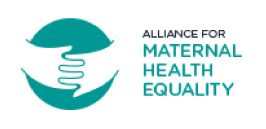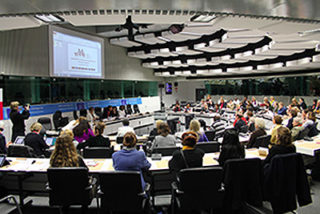The Alliance is not alone in its quest to improve maternal health for current and future mothers.
Make Mothers Matter was founded nearly 70 years ago to raise the awareness of policy makers and public opinion of the vital role of mothers for promoting peace and their contribution to social, cultural and economic development. On 7th and 8th March, coinciding with International Women’s Day, they held a very poignant conference on the challenges regarding mothers and health. Hosted in the European Economic and Social Committee in Brussels, the event attracted a wide array of interested parties and experts, reflecting the interest in the topic. It concluded with the overarching message that women are, can, and need to be, agents of change in their communities when it comes to promoting sustainable health.

Jacqueline Bowman attended the event on behalf of the Alliance for Maternal Health Equality.
Echoing the Alliance’s message to policy makers, the conference highlighted the fact that “maternal health is not just an issue in the Global South” … and that …”both developed and developing countries must work together to improve the health and opportunities for women and children.”1
The concept of sustainable health refers not only to the mother during the perinatal period (defined at the period during pregnancy and the first year after childhood), but also to the child who is inevitably impacted by the mother’s health and wellness. A mother’s nutritional health during pregnancy for instance will affect her child well into adulthood.
What is of particular interest to the Alliance is the grassroots dimension to Make Mothers Matter and their conference. Central to their philosophy is the fact that we cannot rely on policy alone; real people need to be able to see and feel the real impact of policy. The sharing of real-life examples during the conference – like the Mama Café in the Netherlands – brought home the need for tangible sources of support for women. Mama Café is a network of meeting places for mothers to exchange their experiences about children’s health and education. Through the network, women are empowered to make informed decisions, and can learn from others.
From an Alliance perspective, it was refreshing to see and feel a shift from the traditional rhetoric to tactical implementation, and to see how collaborating with established grassroots organisations can complement our efforts at policy level.
1Source: MMM Press Release 8th March 2016 (International Women’s Day: Mothers as changemakers for sustainable health)






